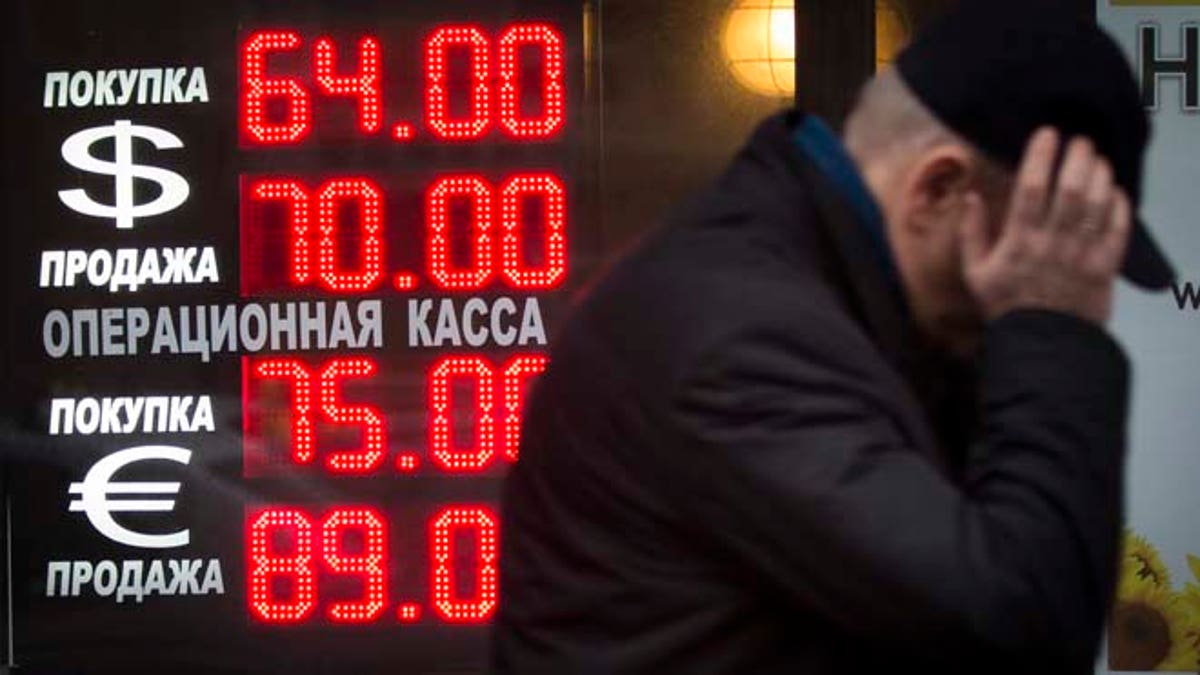
Dec. 16, 2014: Signs advertising currencies light next to the exchange office in Moscow, Russia. After a massive overnight rate hike by Russia's Central Bank, the ruble staged a two-hour rally Tuesday morning before rolling back to new historic lows. (AP)
MOSCOW – The Russian ruble faced intense selling pressure Tuesday, falling at one stage by a whopping 20 percent to historic lows despite a massive pre-dawn interest rate hike from the country's central bank.
The surprise decision to raise the rate to 17 percent from 10.5 percent came in the middle of the night and represented a desperate attempt to prop up the troubled currency. The ruble has fallen sharply in recent weeks as a result of sliding oil prices as well as the impact of Western sanctions imposed over Russia's involvement in Ukraine.
The collapse in the ruble, which has spurred ordinary Russians to buy imported products such as fridges and cars and is stoking inflation, is likely to heap pressure on President Vladimir Putin. Still, support for Putin appears to be holding up. State television, meanwhile, urged citizens not to panic amid Tuesday's rout.
The Central Bank's move on interest rates aimed to encourage currency traders to hold onto their rubles — doing so gives them potentially big returns, certainly in comparison to many other currencies, such as the dollar, where the interest rate returns are near zero percent.
The ruble traded at 72 per dollar late Tuesday afternoon. That's a modest improvement on where it was earlier — it hit 78.5 to the dollar — but still means the currency is more than 60 percent down from where it was in January.
Timothy Ash at London-based Standard Bank described the ruble's fall as "the most incredible currency collapse I think I have ever seen in the 17 years in the market, and 26 years covering Russia."
Ash said "there is now a huge credibility gap for Russian policy makers in the eyes of the market" and that the decline is all the more astonishing given Russia's solid foreign currency reserves and the fact that it runs a budget surplus.
But the message from state television is that there is no need to panic and a weak ruble is actually good for the economy because it will stimulate domestic production and make exports cheaper. So far, Russians appear to trust that the government is able to control the situation. If anything, many see the West as to blame.
Central Bank chairwoman Elvira Nabiullina said the rate hike should stem inflation — higher borrowing costs effectively choke economic activity, dampening down price pressures. However, she conceded that the ruble's value will not be immediately influenced by the rate hike and added that it will take the ruble "some time" before it finds a fair value.
Other options available to the Russian authorities to stem the selling tide could be imposing capital controls or actual intervention in the markets — buying rubles, for example. The Central Bank has intervened directly in the past few months.
Higher interest rates may eventually offer support to the ruble, but it's likely to cause much hardship in an economy that's already heading for recession. Russian stocks were solid on Tuesday, though, with the MICEX benchmark 2 percent up late afternoon.
Neil Shearing, chief economist for emerging markets at London-based Capital Economics, said the rate hike will cause "a further tightening of credit conditions for households and businesses and a deeper downturn in the real economy in 2015."
Given Russia's huge dependence on oil revenues, the recent sharp falls in the price of oil have hit the Russian economy hard. That's exacerbated by the fact that the Russian economy isn't diversified enough to withstand the shock.
The average price of a barrel of oil has dropped below $56 from a summer high of $107. The government recently downgraded its forecast for next year, predicting that the economy will sink into recession. Most international forecasters think the Russian economy is set to contract next year.
Alexei Kudrin, Russia's finance minister in 2000-2011, said on Twitter following the rate hike that "the fall of the ruble and the stock market is not just a reaction to low oil prices and the sanctions but also (a show of) distrust to economic policies of the government."
Kudrin added that the rate hike "should be followed by government measures to raise investor confidence in the Russian economy." He did not say what steps he advocated.








































